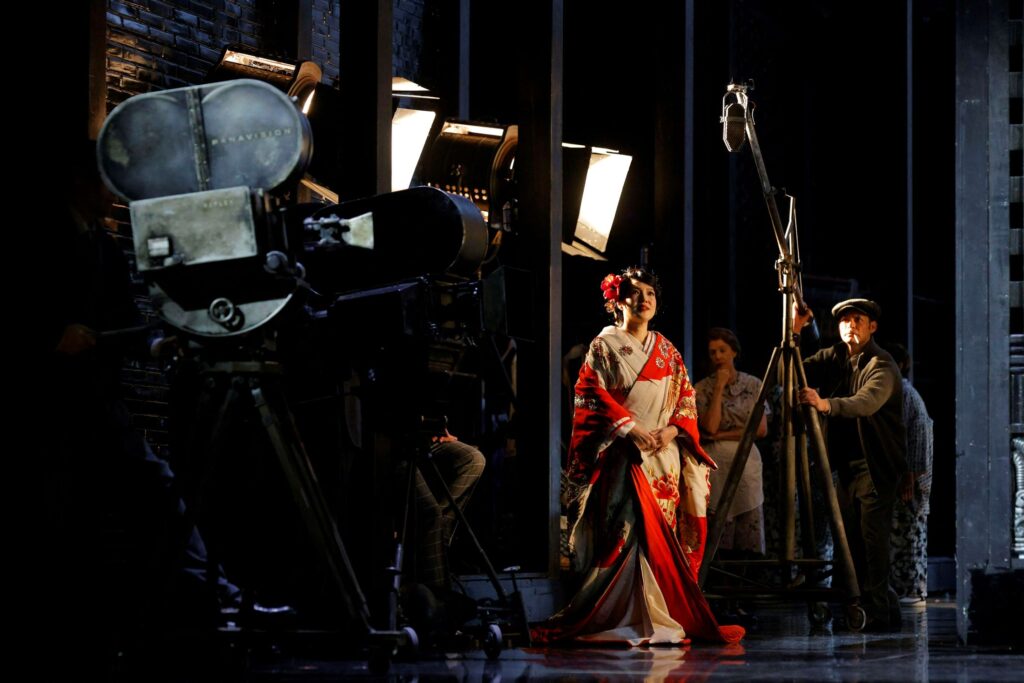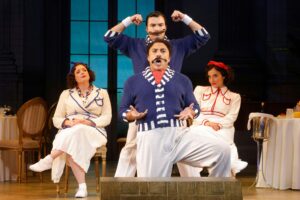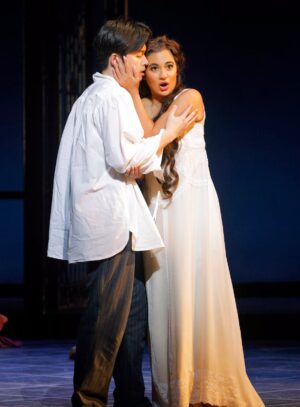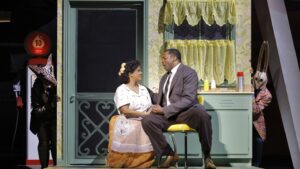LA Opera took care to ensure that their 2024-25 season opener of Puccini’s Madama Butterfly would be “not just another just another Butterfly.” To achieve this, the company imported the Mario Gas production that originated at Madrid’s Teatro Real.
Gas’ vision is simple in concept, if not in scope. The entire opera unfolds on a 1930’s soundstage with the singers playing their roles as cameras and camera operators surround the set and capture the action. These black and white “dailies” are projected onto the screen where the supertitles are displayed. There is also an attempt to create a life for those not on the set, so extras, costume people, and actors preparing to enter are all seen living their lives.
These three realities can make it difficult to choose a focal point at any given moment. Though I can see that younger audiences, more comfortable with having a split focus, might find the concept more involving than a traditional production. For myself, I concentrated on the opera, with occasional peeks at the video to see how a moment translated. Knowing how dull being on a set is, I confess to mostly ignoring that reality.
A look at Karah Son’s resume shows that she has spent a significant amount of her professional career singing Cio-Cio-San (Madama Butterfly) on nearly every continent. This brings a lived-in quality and a layered richness to her interpretation. Son is an impressive Butterfly—tender, mercurial, and passionate; she carefully charts the arc of Butterfly’s journey from eager child bride to forsaken wife. Vocally, she offers a polished and nuanced performance.
Jonathan Tetelman is a rising tenor who has already sung Pinkerton at the Met as well as several important European houses. His Pinkerton is an appropriately handsome and callow young man, though he managed to make the character less of a cad than he might be. Despite an announcement of being under the weather, Tetelman scaled all the score’s heights with a stentorian tone that sounded effortless.
Director Brenna Corner made sure that the secondary roles all delivered on their dramatic moments, creating a cohesive ensemble. Hyona Kim’s protective Suzuki found moments of humor and horror. Michael Sumuel’s Sharpless was no grumbling functionary, but a truly caring diplomat. And Rodell Aure Rosel’s delightfully animated Goro was less an annoying busybody, and more the smartest man in the room.
Ezio Frigerio’s mammoth, revolving set is quite impressive and is also the appropriate background to keep us from questioning the unrealistic conceit that anyone would film a script straight through from beginning to end in one day. Franca Squarciapino’s bold and beautifully colored costumes do much to heighten the story elements and to remind us of the glamour of Old Hollywood.
As always, James Conlon marshals the orchestra with a detailed understanding of the score. But, with Puccini, one can also sense that his heart is very appropriately being worn on his sleeve.
Perhaps the most astounding thing about this cinema-inspired production is that, though it’s apparently more than twenty years old, it did not play Los Angeles sooner.
Dorothy Chandler Pavilion September 21 – October 13, 2024 laopera.org






